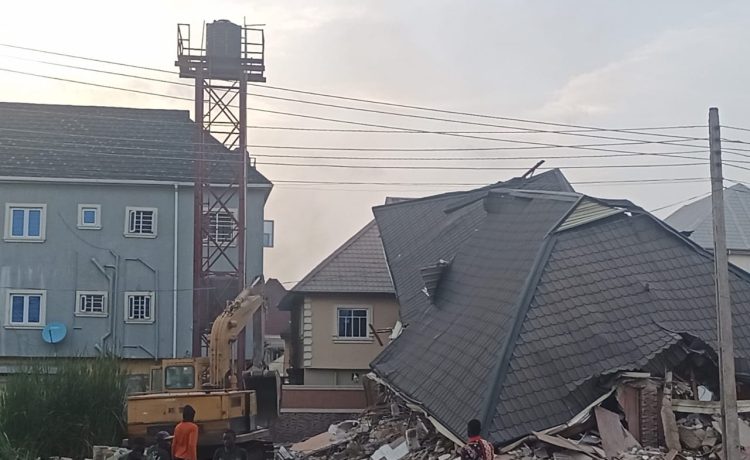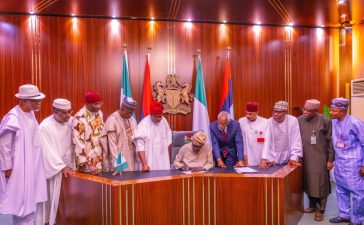Nigerians from various walks of life have expressed deep frustration over the persistent demolitions taking place across Lagos State under the administration of Governor Babajide Sanwo-Olu. While many acknowledge the governor’s intention to safeguard Lagos’ original city plans, they argue that homeowners and landlords should not bear the brunt of penalties for building code infractions that stem partly from inadequate government supervision.
Recent demolition exercises have brought these concerns into sharper focus. In Oworonshoki, a new wave of demolitions began around November 24, 2025, in the Coker axis. On the same day, structures were also pulled down on Lagos Island. Earlier, on October 13, 2025, 17 buildings along the Ikota River Right of Way in Lekki were demolished for encroaching on drainage and water channels. Residents insist these recurring incidents reflect a failure of supervisory agencies to monitor construction activities before violations escalate into the destruction of properties.
These concerns are echoed in a communiqué issued by the Standards Organisation of Nigeria (SON) during a Building/Construction Sector conference held in Abuja. With the theme, “Adherence to Standard Practices: Bedrock of Sustainable Development in the Building/Construction Sector,” the conference criticised the lack of diligence by builders and supervisors in complying with construction standards.
One of the experts at the event, Mr. Ifeanyi Chukwunonso Okeke, stressed that strict adherence to standard practices is crucial for sustainability. He warned that neglecting construction codes has led to repeated building collapses, loss of lives and property, and diminishing public trust. Okeke urged builders to comply fully with regulations to protect both human lives and investments.
The humanitarian consequences of the recent demolitions are becoming more pronounced. Gospel artist Testimony Jaga called on the Lagos State government to address the suffering of residents affected by demolitions along AIT Road, Kola and the Powerline axis. The Lagos State Building Control Agency (LASBCA) said the structures stood on high-tension powerline corridors. However, the demolitions have left many families—especially elderly persons and widows—homeless.
Jaga accused the government of inconsistency, claiming that land initially cleared for public infrastructure projects such as a BRT depot and a Mechanic Village is now being repurposed for private developments including a mall and newly built shop rows. “The demolitions were supposed to facilitate public projects, yet residents are being displaced while private construction begins,” he said.
The stories of affected residents are harrowing.
A widow, Mrs. Adebimpe Oduro, said her only source of livelihood was wiped out when her shop was demolished. Mrs. Shola Ikotun and Mrs. Bisoye Lawal also described the devastating impact of losing the small businesses that sustained their families.
Sixty-four-year-old Mrs. Olabisi Osho, who lived in a home she built with her late husband, recounted how her house was demolished without warning. She suffered a head injury, fainted, and regained consciousness only to find LASBCA bulldozers continuing their operation. “My husband died four years ago. This house was all I had left of him,” she said through tears.
Similarly, 66-year-old Aina Adejare lost the home where she had lived for more than 30 years. “I sleep on the bare ground now. I have no money, nowhere to go, and nobody to help,” she lamented.
Testimony Jaga urged the government to adhere to original plans for a BRT depot and Mechanic Village, arguing that those public projects would generate jobs and strengthen the local economy while avoiding the displacement of vulnerable residents. He also called for immediate compensation for affected people, particularly widows and elderly individuals who now sleep outdoors without access to shelter, food or water.
He described the situation as “a humanitarian crisis that requires urgent government intervention,” stressing that the rights and welfare of displaced residents must be protected.
As Lagos strives to balance rapid urban expansion with infrastructure development, the demolition crisis highlights a troubling tension between enforcing planning laws and safeguarding citizens’ welfare. While the government’s goal of upholding the city’s structural integrity is widely recognised, residents and civil society insist that stricter supervision, greater transparency and humane considerations must guide future enforcement actions.
Stakeholders warn that without a people-centred approach that aligns urban renewal with the socio-economic realities of residents, even well-intentioned policies risk eroding public trust and deepening social hardship. Sustainable urban development, they argue, must prioritise accountability, fairness and the protection of vulnerable populations.







